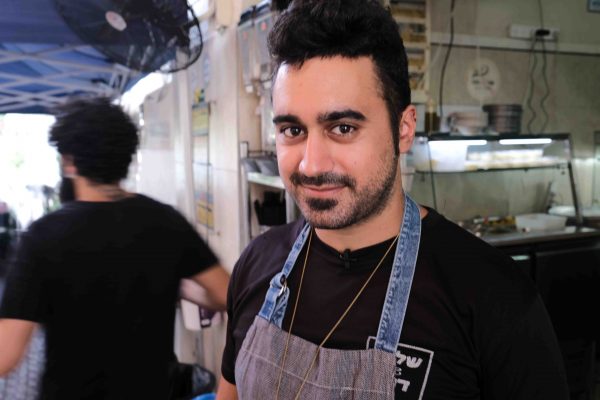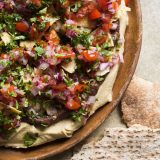
Tel Aviv's Shlomo & Doron is known today for its wildly creative takes on hummus. But when Sa’adia Shore first opened this tiny eatery in 1937, there was just one item on the menu—and it wasn’t hummus. For years, Shlomo & Doron (named for Sa’adia’s son and grandson) served only fūl, or pureed fava beans. It stayed that way until Doron Shore inherited the family business. It was his idea to add hummus to the menu, and it proved to be a hit with customers. The restaurant still operates out of its original location in the Yemenite Quarter, a tranquil neighborhood that, compared to its bustling, cosmopolitan Tel Aviv surroundings, has changed remarkably little over the past century. Shlomo & Doron, however, continues to reinvent itself as fourth-generation owner Elad Shore shakes things up with experimental offerings such as Balkan Hummus, Shakshuka Hummusand even Mexican Hummus. Fūl, however, definitely still is on the menu.
Please do not visit Tel Aviv only in search of the classics: shakshuka, hummus, lahmajoun or siniya. You can find them, if you like, but you are more likely to discover these dishes in disguise, casually dressed and wildly accessorized by young chefs who like tradition, but only as a starting point.
Spend an hour at a sidewalk café one evening and the parade of electric scooters, quick-paced, suntanned pedestrians (nobody walks slowly here), and the fresh, festival atmosphere make one thing clear: This is Tel Aviv, the seaside city of the future, not Jerusalem, a town steeped in history.
Milk Street’s editorial director, J.M. Hirsch, had been here a few years before and recommended Shlomo & Doron, a fourth-generation family-run temple of hummus and fūl (cooked fava beans) in the city’s Yemenite Quarter. The storefront is tiny, much like a taqueria, and the proprietor, Elad Shore, is young and handsome. Tables are located in a narrow street covered by a blue awning—Tel Aviv cafés and eateries often mix traffic with dining—and Shore emerges from his lair of hummus ready with a smile and a handshake.
Inside Shlomo & Doron, Shore shows me his huge pot of fūl. The beans are cooked down until most of them dissolve into a thick sauce. One of his best dishes is “Fūl Fully Loaded,” which includes egg, lemon, garlic, tahini, cumin, paprika and extra-virgin olive oil.
After pouring us some exceptional cold mint tea—served in a canning jar—Shore brought out various hummus variations, including Balkan Hummus (roasted eggplant, pickled onion, Kalamata olives, parsley and sumac); Shakshuka Hummus (tomatoes, vegetables and eggs topped with green chili and parsley); Falafel Hummus (chopped falafel inside with tomato, red onion, herbs, tahini, plus a local chutney on top); and a Mexican Hummus (black beans, chopped jalapeños, pico de gallo, coriander, peppers, tomatoes and broken tortilla chips).
The Mexican version was my favorite, not just because I loved the big, bold flavors, but because I loved the crazy idea of it. The world of food waits for no one, and for culinary tourists to demand only the classics is far too hidebound. I still love a traditional bowl of well-made hummus, warm and whipped, but I also appreciate that one of the oldest hummus establishments in Tel Aviv is mixing it up. Why not? That’s the real and unfolding story of food.
Related Recipes
January-February 2021

Sign up to receive texts
Successfully signed up to receive texts!
We'll only send our very best offers - Like a $15 store credit to start.
By entering your phone number and submitting this form, you consent to receive marketing text messages (such as promotion codes and cart reminders) from Christopher Kimball's Milk Street at the number provided, including messages sent by autodialer. Consent is not a condition of any purchase. Message and data rates may apply. Message frequency varies. You can unsubscribe at any time by replying STOP or clicking the unsubscribe link (where available) in one of our messages. View our Privacy Policy and Terms of Service.





